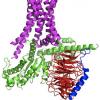It may or may not help, but worth a try. It was the only thing that cured my (recent) stubborn acne.
Study 1: Zinc salts in Dermatology Ann Dermatol Venereol. 2004; 131(5):455-60 (ISSN: 0151-9638)
Zinc is an essential trace element for the human organism. It acts like cofactor for the metalloenzymes involved in many cellular processes. Its anti-inflammatory activity, which is the basis of therapeutic use, other than acrodermatitis enteropathica, is not well known: production of cytokines, antioxidant activity. Its toxicity is very low, but marked at high doses during chronic administration by the risk of hypocupremia. It is not teratogenic and can be given during pregnancy. Its absorption, through the duodenum, is inhibited by excessive phytate intake. Maximum concentration is reached after 2 to 3 hours. It is widely distributed in the organism, mainly in muscles and bone. Excretion is predominantly digestive. Its spectacular effect in acrodermatitis enteropathica, through compensation of genetically determined malabsorption was discovered in 1973. Its usefulness in acne is based on the anti-inflammatory action and was first described with zinc sulfate, then with better tolerated gluconate. Many controlled studies have shown an efficacy on inflammatory lesions. Doses varied from 30 to 150 mg of elemental zinc and studies against cyclines have shown that minocycline has a superior effect; but zinc might be an alternative treatment when cyclines are contraindicated. To date we don't have convincing data for its use in other indications (leishmaniosis, warts, cutaneous ulcers). Tolerance at usual doses (200 mg of zinc gluconate or 30 mg of elemental zinc) is good. Major side effects are abdominal with nausea, vomiting, but are fleeting and dose dependent.
Study 2: Effects of oral zinc and vitamin A in acne.
The effects of oral zinc sulfate (corresponding to 135 mg of zinc daily) alone and in combination with vitamin A (300,000 international units) daily on acne lesions have been compared with those of vitamin A alone and of a placebo.
The number of comedones, papules, pustules, and infiltrates were counted at each visit. After four weeks, there was a significant decrease in the number of papules, pustules, and infiltrates in the zinc-treated groups. The effect of zinc plus vitamin A was not better than zinc alone. After 12 weeks of treatment, the mean acne score had decreased from 100% to 15%. The mechanism for the effect of zinc therapy in acne, to our knowledge, is not presently known.
Study 3: A double-blind study of the effect of zinc and oxytetracycline in acne vulgaris.
With a double-blind technique, the effects of oral zinc and tetracyclines were compared in 37 patients with moderate and severe acne. No difference in effect between the treatments was seen and no side-effects were noted in any group. After 12 weeks of treatment, the average decrease in the acne score was about 70% in both groups.
Study 4: Zinc sulfate in acne vulgaris. Weimar VM, Puhl SC, Smith WH, tenBroeke JE Arch Dermatol 1978 Dec;114(12):1776-8
The effects of orally administered zinc sulfate in 52 patients with mild to moderate acne vulgaris were compared to those of a placebo capsule.
The numbers of comedones, papules, pustules, infiltrates, and cysts were counted at each visit over a 12-week period. Forty patients completed the study. Zinc appeared to have a somewhat beneficial effect on pustules but not on comedones, papules, infiltrates, or cysts. Fourteen patients (50%) in the zinc group had side effects of nausea, vomiting, or diarrhea. Six patients (21%) in the zinc group could not tolerate the nausea and withdrew from the study
Study 5: Multicenter randomized comparative double-blind controlled clinical trial of the safety and efficacy of zinc gluconate versus minocycline hydrochloride in the treatment of inflammatory acne vulgaris. Dermatology. 2001; 203(2):135-40 (ISSN: 1018-8665)
BACKGROUND: In addition to tetracyclines, zinc may constitute an alternative treatment in inflammatory lesions of acne. OBJECTIVE: To evaluate the place of zinc gluconate in relation to antibiotics in the treatment of acne vulgaris. METHODS: Zinc was compared to minocycline in a multicenter randomized double-blind trial. 332 patients received either 30 mg elemental zinc or 100 mg minocycline over 3 months. The primary endpoint was defined as the percentage of the clinical success rate on day 90 (i.e. more than 2/3 decrease in inflammatory lesions, i.e. papules and pustules). RESULTS: This clinical success rate was 31.2% for zinc and 63.4% for minocycline. Minocycline nevertheless showed a 9% superiority in action at 1 month and one of 17% at 3 months, with respect to the mean change in lesion count. Regarding safety, the majority of the adverse effects of zinc gluconate and of minocycline concerned the gastrointestinal system and were moderate (5 dropouts with zinc gluconate and 4 with minocycline). CONCLUSION: Minocycline and zinc gluconate are both effective in the treatment of inflammatory acne, but minocycline has a superior effect evaluated to be 17% in our study.
Edited by Matt, 13 September 2017 - 04:33 PM.




















































